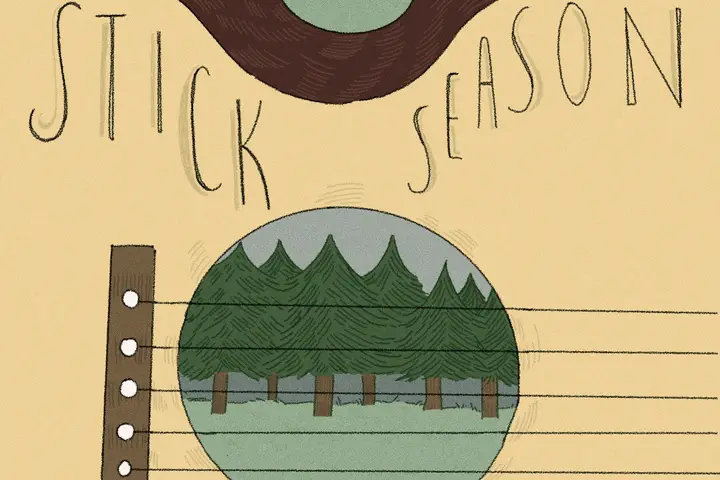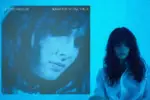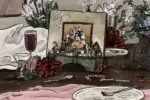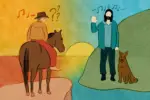On June 9, folk-pop musician Noah Kahan released “Stick Season (We’ll All Be Here Forever)” (2023), an addendum to his previous release, “Stick Season” (2022). The deluxe album adds seven new songs to the tracklist, elaborating on the themes of the original album: feelings of inadequacy, loneliness, abandonment and captivity. Kahan writes from a place of melancholy, as the vast body of his work, regardless of subject matter, is underscored by a deep-rooted sadness. In this new album, Kahan narrates the story of his upbringing in his hometown of Strafford, Vermont through a string of profound, poetic lyrics.
The opening track “Northern Attitude” revolves around the fear of letting people in, setting the tone for the following twenty songs. To allow himself to be known and loved, Kahan must allow people to see his flaws: “If I get too close / and I’m not how you hoped / forgive my northern attitude / oh, I was raised out in the cold.” He blames his alleged flaws on his upbringing, and listeners can pick up on a sense of bitterness toward the place he calls home. Nevertheless, the track lacks ire; its forgiving tone and upbeat melody convey self-hatred on Kahan’s part. He directs his bitterness inward, and blames himself for being abandoned, as if being abandoned is not a two-person affair. Whispered, barely audible, a single word ends the song: “sick.” Perhaps the most important word in the entire track, it establishes Kahan’s belief in his own infirmity, looks listeners in the eye and asks, “Who could love someone so fundamentally ill?”
The following song, the eponymous “Stick Season,” refers to the Vermont locals’ name for the bald November trees. Riddled with lyrics conveying insecurity and self-loathing, the song explores Kahan’s mental state following a breakup. Kahan credits his own imperfections for driving his partner away and condemns his inability to escape his intrinsic brokenness: “I thought that if I piled something good on all my bad / that I could cancel out the darkness I inherited from Dad.” From a purely sonic lens, “Stick Season” is gentle on the ears, with subtle guitar chords and unstrained vocals, establishing the idea that Kahan has become so acquainted with pain that he can be phlegmatic as he describes it. Themes of broken selfhood reemerge in “Come Over,” as Kahan begs someone to come to him and overlook his faults. As he feels himself “losing [their] interest,” he bargains, proclaiming “you don’t have to tell the other kids at school.” He believes he will be more appealing to people if they are allowed to keep him a secret, to love him in the dark. Arguably the most devastating line of the entire album comes at the resolution of the song: “Someday I’m gonna be somebody people want.” Each word Kahan utters is saturated with emotion and the sense that his very asking for love is shameful. He is haunted by the inescapable reality that love is reserved for other people, and he isn’t one of them.
“New Perspective” diverges from the morbidity of the previous songs, instead focusing on the experience of watching a childhood friend return after living in an urban area for a period of time. Kahan finds that his old friend has been changed immutably by new ideologies and opinions, and he wishes he could have the old version of his friend back. The loneliness and acrimony he feels as a result of this perceived abandonment underscores the entirety of the song. Kahan sings: “You and all of your new perspective now / wish I could shut it in a closet and drag you back down.” He forgoes any pretense of happiness for his friend’s personal development because the friend went ahead and changed without him. “Orange Juice” may be written about the same friend. Kahan asks a friend to come over after a period of absence, to which they reply: “…my life has changed … this town had changed / and you had not.” The speaker’s sharpness towards Kahan is startling; they blame him for stagnating, for his fecklessness. “New Perspective” and “Orange Juice” explore the underlying resentment from both sides of the conflict: Kahan is angry at his own obsolescence, and the other person is angry at their friend-turned-fetter. The affectionate tenderness in Kahan’s voice, paired with both songs’ optimistic tunes, undermines the harshness of his words and the message is made clear: above all else, he just wants his friend to stay.
“Homesick” similarly describes Kahan’s experience of feeling trapped in Strafford, Vermont. Kahan sings of how the town’s smallness and dimness have suffocated him for decades. Despite the overwhelming weight of small-town life, he cannot summon the strength to leave: “I would leave if only I could find a reason.” With this line, the instrumentals reach a previously untouched level of intensity and Kahan’s belting reveals the rawness of this sentiment. His aspirations do not sufficiently overcome the inexplicable comfort of being stuck. Living in such melancholy for so long has weakened his ability to conceive of a life elsewhere. Kahan asserts that “[he] will die in the house that [he] grew up in.” The homesickness Kahan refers to in the title is nebulous; he has not yet left home, and he has not yet found it either. Rather, he is sick of yearning for a place to belong from the confines of the place he should belong.
“The View Between Villages – Extended” is the final song in the album, an altered version of the original track, “The View Between Villages.” Included in the extended version are segments of interviews from Strafford locals, contradicting the rest of the album’s themes. Though the music prior to the final track screams with desperation and pain, the interviews provide a refreshing new side to the story. An anonymous man says, “I guess it’s a small, small community of people that really look out for each other.” An elderly woman says, “I found a town big enough for anything that I want.” As Kahan sings, he recounts “the things that [he] lost here / the people [he] knew.” After over an hour of pleading for escape, Kahan begrudgingly admits that this place he grew up in has been his home. It is simply time to leave. “The View Between Villages – Extended” retroactively alters the meaning of the album because it proposes an alternate experience of Strafford. Joy can be found in the languor of small-town life if one is willing to slow and match its pace.
Looking at Kahan’s life today, it is unlikely that he will die in the house that he grew up in. Kahan now lives in Watertown, Massachusetts and is currently on a fully-booked, four-month tour across the United States. On Spotify, “Stick Season (We’ll All Be Here Forever)” has amassed almost half a billion listens. Kahan began his career in a town with barely 1,000 people; it is a testament to his breathtaking emotional and musical capabilities that his work has garnered such a massive international following. It is with grateful ears and hearts that Kahan’s fans worldwide appreciate his radical honesty and vulnerability, and await what is yet to come.
















